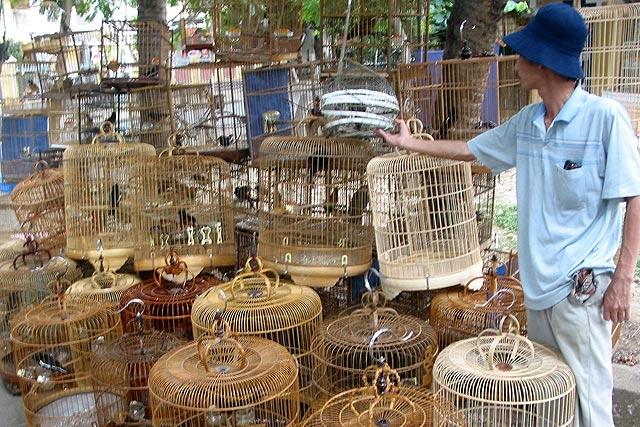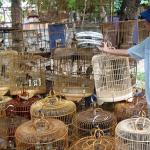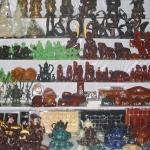Bargain Hunting in Vietnam’s Markets
Haggling is the way most of the world does business. Like most Americans, it's not a practice I'm accustomed to, but I've gotten used to it. Sometimes however, I get tired of the arguments over every item on my grocery list and concede too easily. It's also possible to err on the other side and be too aggressive, and thus insult the shop owner.
One of the first things that travelers discover while shopping is that Vietnamese merchants do not haggle as freely as in surrounding countries. I was a little surprised when I first arrived from Cambodia and found that no matter how much I haggled in some shops, the price never changed-even when I pretended to walk away. Vietnamese shop owners are admittedly stubborn. This is not a simple attitude of locals verses foreigners. People from Hanoi make the same complaints when they visit Ho Chi Minh City, and Dalat is notoriously overprices according to HCM residents. There is a common sentiment in Vietnam that if you are traveling, then you are on vacation-and if you are on vacation, it means you have money to burn. Most Vietnamese save up for years to go on vacation, if ever at all. The unfortunate reality is, even if you know exactly what a price should be, it doesn't mean they seller will let you pay that price.
In general, travelers can assume priced offered to them are double the "normal" street price. In some cases it can even be up to 5 times the normal price! If you ever find yourself saying, "This is more than I would pay at home!" (you might find yourself saying that a lot), then it is obviously too much. This isn't to say that there aren't very kind-hearted people who charge the same price no matter who you are-but you've usually got to get off the tourist track to find them.
Fortunately, there are a few things you can do to keep costs down. First of all, you can get a local to help you-although you must be selective. I made the mistake during my first year in Vietnam, of asking my male friends to help me buy things in the market. Males rarely do the shopping in Vietnam, and thus don't have a clue in the market. They'll settle on any price. Ask a female friend-better yet, as a friend's mother to help you.
Grocery shopping can be tedious if you are making a large meal and have to argue about the price of every ingredient. In the end, you may find it is still cheaper to just eat prepared meals in the market. The food is tasty and just as sanitary as most restaurants (where do you think they buy their groceries after all?); it offers a great chance to meet people; and it is a much better way to be introduced to the local culture than making meals alone in your room.
Beware of aggressive and overly friendly merchants at the front of the market who try to seduce you with their exceptional English. They are always the most expensive. The same goes for bystanders that aggressively offer to help you with talking down the price. They usually get a commission for every sale they assist with. Sometimes when I bring my Vietnamese friends with me, the shop keepers offer (speaking in Vietnamese) to give my friends a commission if they convince me to pay a higher price (thinking that my friends are not friends at all, but rather a driver or tour guide). Thankfully my friends are decent people, and took the commission for the sale-and then gave the money back to me!
There are plenty of kind young Vietnamese students who want to practice their English by talking to foreigners, but they don't hang out in the market. Instead, find your way to the back isle where stall owners are shy and speak little to no English. It's more adventurous but you'll get the best prices.
If you find yourself wanting to purchase something but don't know what a reasonable price is, there are several things you can do. The obvious thing to do is wait for a local to purchase the same item and observe how much they pay. The shop owner still may not agree to let you have the same price, but this allows you to shop around in other locations, equipped with your new knowledge, in the hopes of getting a more realistic price.
You can also use deductive reasoning. If you want to buy something but don't know the price, first look around for something else (that you don't want to buy) for which you already know the street price. Ask what the price is in this shop. You can then gage how reasonable the shopkeeper's prices are in general, based on the asking price of the item you already know.
Playing shops against each other to work down a price can be a dangerous game. I made the mistake of going from shop to shop in an aisle once, asking if they could each beat the other's price. Very quickly a violent brawl broke out among the shop owners, and then a riot erupted that had to be broken up by the police. Fortunately I was able to slip out the back alley as the security came in the front. Adjacent shop keepers often agree to fix prices to keep the peace, and when one person caves under the temptation of making a sale, it can get ugly. When using this method, you may want to bounce back and forth between opposite ends of the market.
Use Vietnam currency whenever possible. They are much more precise because of their lower value. Keep plenty of small change too. Taxi drivers (including cyclos and motorbike drivers) rarely seem to have change for large bills.
Whenever possible, shop in places with fixed prices-but avoid posh shopping centers like Diamond Plaza in downtown Saigon. Large Vietnamese book store chains have impressive gift departments with Cham blankets, pottery, maps, dictionaries, lanterns and other great souvenirs at a fraction of the price you'll pay in tourist stores.
While some cities (or neighborhoods) are known for specific crafts-such as tailors in the tourism district of Hoi An, try looking for what you want in other cities or neighborhoods. You can find most traditional Vietnamese crafts in almost any city-it's just a matter of tracking them down. When you do, you can be certain that you are paying cheaper prices, and buying the quality that local people expect-and whatever it is won't break before you get it home.
Learning a little bit of the language can go a long way. Not only do you gain the curiosity and admiration of locals, but it also creates a situation for more friendliness and openness. On many occasions after chatting in Vietnamese with stall owners I have been invited to sit and eat or drink at food stands for free. Learning a language in any country shows dedication and humility on your part, which opens many doors for new experiences and may help you save a few dollars along the way.
 ThingsAsian
ThingsAsian



















